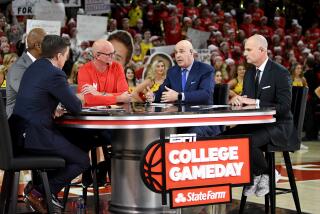Track Confirms 1999 Fraud
- Share via
An Autotote employee at Delaware Park was fired from his job in 1999 after counterfeiting a winning mutuel ticket, a track official confirmed Friday night. The incident was not unlike a yearlong scheme carried out more recently by Chris Harn, who was fired in October by Autotote for his inside role in the $3-million Breeders’ Cup pick-six scam.
Bill Fasy, chief operating officer at Delaware Park, said that the dismissed employee, whom he would not name, reprinted the serial number of an uncashed ticket that was almost a year old and cashed it for $300. Fasy said he was convinced that there was no connection between the Delaware Park worker and Harn. Fasy said there have been no subsequent reports of ticket-counterfeiting at the track.
Although the Autotote employee at Delaware, whose scheme was first reported in the Washington Post, may not have been part of the Harn ring that trafficked in races at five other Eastern tracks and two in Illinois, and although the $300 pales in comparison with the millions that Harn and his companions were playing for, the 1999 firing still adds to widespread concerns about security breaches at tote companies that service tracks. An executive of the National Thoroughbred Racing Assn. told the California Horse Racing Board on Thursday that his organization has started an investigation, costing at least $3 million, that will examine the Breeders’ Cup scandal and other possible tote irregularities.
Harn, 29, and two other 29-year-old men were charged in the Breeders’ Cup case, and in a New York federal court on Wednesday, Harn pleaded guilty to single counts of conspiracy to commit fraud and conspiracy to launder money. In addition to their attempted score on the Breeders’ Cup races at Arlington Park, the Harn group is believed to have cashed other multiple-race bets worth more than $100,000 at Belmont Park and Balmoral Park.
Money from outstanding winning tickets -- called “outs” -- is paid out to bettors if the tickets are produced within a certain time frame after the race. In some states, bettors have a year to cash. After the deadline, depending on the state, the money is distributed to the state, the racetrack, horsemen for purses and racing benevolent groups.
The fired Autotote employee in Delaware was caught, Fasy said, because of a surveillance camera and physical observation by the track’s mutuel manager. Fasy didn’t know whether the tote company brought charges, and Autotote representatives couldn’t be reached. The company, which is based in Newark, Del., processes 65% of the more than $14 billion that’s annually bet on horses in the U.S.
More to Read
Go beyond the scoreboard
Get the latest on L.A.'s teams in the daily Sports Report newsletter.
You may occasionally receive promotional content from the Los Angeles Times.










